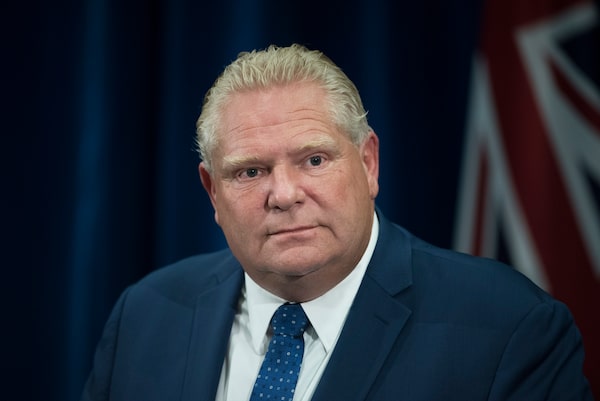
Whether or not legislators think the judge was offside when he ruled the council law invalid, Doug Ford's use of the Constitution's "notwithstanding clause" is an outrageous abuse of the override power.Fred Lum
Ours is a government of laws not of men. Even the strongest mandate from voters doesn’t make our leaders all-powerful. They are subject to the law like anyone else.
It’s a shame – no, a scandal – that the Premier of the country’s most populous province doesn’t understand that. Doug Ford’s plan to invoke the Constitution’s “notwithstanding clause” to override a judge’s ruling is the most gratuitous use of that dubious instrument since its creation nearly four decades ago. He is using the nuclear option for a skirmish.
When governments consider using the clause to override judicial decisions, it is usually when some fundamental issue is at stake – say, French-language protections in Quebec. Mr. Ford is using it to uphold a law that would reduce the number of elected councillors at Toronto city hall. Whether a single city has 25 councillors or 47 is hardly fundamental to the province.
Yet Mr. Ford is recalling the legislature on Wednesday for an emergency session to pass a new council-cutting law and override the judge’s ruling. He claims it will be a free vote. Legislators with any backbone at all should vote against it. Whether or not they think the judge was offside when he ruled the council law invalid, this is an outrageous abuse of the override power.
Mr. Ford isn’t just challenging one judge on one ruling, he is challenging the rule of law itself. He says he may use the notwithstanding clause again if he feels like it. After all, he kept saying, the judge was merely appointed. He, Mr. Ford, was elected. “He’s the judge, I’m the premier.” In other words, his mandate from the voters outweighs the authority of a quibbling judge with a pile of dusty law books on his desk.
Related: Premier Doug Ford defies court, vows to override Toronto council-cuts ruling
Doug Ford Year One: What’s happened so far in the new Ontario
When a judge can shoot down the decisions of an elected government, the Premier says, “That’s scary, that’s disturbing.” No, what is disturbing is that a premier thinks he can do whatever he pleases just because he has a bond with the masses. Mr. Ford's performance on Monday was pure populism. Railing against unelected judges who thwart the will of the people is straight from the playbook. So is ranting about the special interests, the activists and left-wing downtown councillors who couldn’t get another job if they tried. It is precisely to curb the excesses of men such as Mr. Ford that we have a Constitution and a Charter. Now Mr. Ford is thumbing his nose at those vital documents.
He claims the people will be with him on this. I wonder. Canadians are a law-abiding bunch. They revere the Charter. They understand that democratic government includes checks and balances. That is one reason the notwithstanding clause is so seldom invoked. No Ontario premier has dared to use it. Mr. Ford is the first, and his government is only weeks old. Where will he wield it next? To turn back the clock on sex education? To wind up supervised drug-use sites? To cancel binding contracts or labour deals?
Judicial oversight exists to keep our elected leaders from acting in a high-handed, arbitrary, capricious or vindictive fashion. Mr. Ford’s decision to slash the size of council in the midst of an election campaign was all of those things. He didn’t consult the voters or the government of Toronto. He didn’t talk about his plan as he was running for election. When Toronto fought the move in court, his lawyers argued in essence that the province could do as it wished to a junior, subordinate level of government.
Well, there are limits. Mr. Ford clearly exceeded them. As Justice Edward Belobaba argued in his crisp and forceful ruling, the Premier’s decision to radically redraw the city’s electoral map while an election campaign was already fully under way “is without parallel in Canadian history.” The legislation cutting the number of city wards to 25 from 47 “was hurriedly enacted to take effect in the middle of the City’s election without much thought at all, more out of pique than principle.”
The judge found not a scrap of evidence that Mr. Ford bothered to consult about his decision or to consider other options. He found no substantial evidence, either, for Mr. Ford’s dubious contention that city council was “dysfunctional” because of its existing size or that it would suddenly become a marvel of efficiency with half as many councillors.
Like his late brother before him, Mr. Ford tends to think that the rules are for someone else. His, after all, is a government “for the people.” But it is not above the law. Trying to put it there could be his undoing.
 Marcus Gee
Marcus Gee